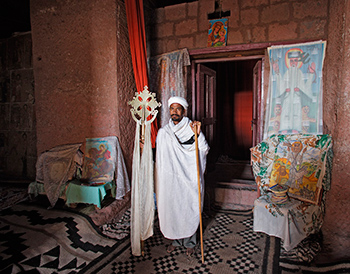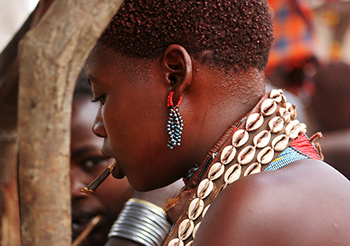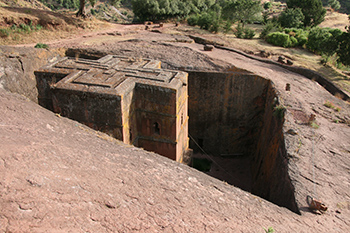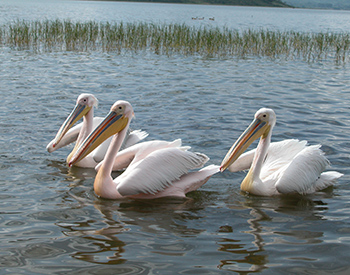Exclusive interview with Travel Ethiopia, a woman-led tour operator from Ethiopia
Samrawit Moges, Managing Director of Travel Ethiopia
“What makes us different from the neighboring countries like Kenya, Tanzania and Uganda is that our attractions are not just nature and wildlife, but they are much diversified,” notes Mrs Moges. Her company Travel Ethiopia, which she established in 1994, is distinct from other tour operators because of Mrs Moges’ tourism background and the company’s “woman-led” character. Among others, Mrs Moges discusses the role of Travel Ethiopia and explains why she does not believe in receiving aid. For the future, Travel Ethiopia wants to branch out and open offices in the various attraction sites throughout Ethiopia.
Interview with Samrawit Moges, Managing Director of Travel Ethiopia

What is your overview of the tourism sector in Ethiopia and what is your outlook for 2014 and onward?
Ethiopia is a very unique country, particularly in the eastern part of Africa. What makes us different from the neighboring countries like Kenya, Tanzania and Uganda is that our attractions are not just nature and wildlife, but they are much diversified. We have culture, history, nature and scientific tours. Particularly the scientific tours in the Afar area, which has volcanoes, have become one of the most popular attractions.
As you might know, Ethiopia is the origin for mankind, where we claim that human beings originated. It’s not only human beings, but we also claim that coffee is from Ethiopia. Of course, we used to have a lack of infrastructure because privatization only started after 1991. Under the current government, the infrastructure has grown tremendously, particularly in road construction projects. We certainly need to work on a lot in our infrastructure, as we are also targeting the high-end clientele.
Our numbers are also increasing. We need to work on human resources and training people for these sectors. My view about Ethiopia is that in a very short time, Ethiopia will be one of the highly-frequented destinations on the continent. We haven’t done much on promotion; Ethiopia is mainly known for poverty and hunger in the world but this has changed a lot. We also need to open offices and the government in collaboration with the private sector, needs to open offices in other parts of the world where we will be able to provide more education to the outside world.
Can you give us a brief history of Travel Ethiopia since its inception? What are some of the accomplishments you have achieved?
In Ethiopia, during the time I graduated from the Addis Ababa University, it was a socialist regime. I did not have any intention of joining the tourism sector; it was by accident that I joined it. I graduated as a journalist but I’m glad I didn’t work as a journalist particularly at that time. I worked at the time for what was the sole tour company in the country – the National Tour Operation – for about ten years. In 1993, I left that company and I established Travel Ethiopia in 1994.
One of the things that make Travel Ethiopia different is that I have a very good background in tourism. It’s not simply operating a tour company. Fortunately, I got a scholarship during my work with the government at which time I also studied tourism management in Italy and I had office experience in the US. Of course, I do have rich contacts from while I was working for that company.
Another thing that makes Travel Ethiopia very different is that it is a woman-led company where the sector requires meticulous work. You see most of the people working here, particularly in the office, are women. This makes for very careful work. There are no mistakes; there are no minor or major mistakes – a mistake is a mistake. We also are the first company to hire female guides. I strongly believe that is the role of women to tell about the community and one of the attractions that we have is community tourism. How are the weddings and funerals held in this country and how do they prepare their food?
What makes us different from the neighboring countries like Kenya, Tanzania and Uganda is that our attractions are not just nature and wildlife, but they are much diversified. We have culture, history, nature and scientific tours. Particularly the scientific tours in the Afar area, which has volcanoes, have become one of the most popular attractions.
We have very diversified ethnic groups so this is a company led by a woman and it also gives priority to women in general. We do women trips; this is to show how the Ethiopian family lives. If you go to the south, it is the women who are the hard workers. I call them the bread-makers. At the same time we are also working on, not eradicating, but minimizing negative traditional practices.
For example, we have a sister company in Ethiopia and we do have a lodge in the eastern part of the country. In this area, there is polygamy and through our lodge, we have tried to minimize this and at the same time empower women. I’m really proud that Travel Ethiopia is a company that fulfills its corporate social responsibility by taking part in its various commitments. For example, we have twenty children on the school feeding program in Addis and we have also educated two or three people from remote areas and they studied in one of the universities. Gladly, they have gone back to serve their communities. These are some of the accomplishments that we have achieved. Our main priority is to give quality service where our clients get a good value for their money. Of course, we are very reliable and service-oriented.
What part of the world do most of your clients come from?
Before 9/11, the majorities were Americans but it declined after that. Now it is reviving. To our surprise, nowadays the Polish are one of the highest percentage of travelers coming to this country. The Brazilians have also started visiting. It used to be mainly from the European countries, like the Germans, Italians, and French. Now the good thing is that Ethiopian Airlines is diversifying; they are opening flights from various parts of the world such as Brazil, Korea and many others. At the same time, the new international carriers are coming to this country which also makes it diversified. The other great thing is that people, after their visit when they go back home, they are our ambassadors. They put it on Twitter and on Facebook, so this word of mouth is how we are getting most of our clients. I strongly believe that we have a very bright future.
 What type of marketing tools are you using to increase your market share?
What type of marketing tools are you using to increase your market share?
Mainly what we do is we attend travel fairs, like the one in the U.K., the Berlin yearly fair and in Italy. We are marketing ourselves through travel fairs. I think one of the things that we lack in this country is the aspect of marketing and we really need to work on that.
What region of Ethiopia are you marketing?
We market all areas of Ethiopia. We are also sending our clients to Kenya, Tanzania and Southern Sudan but when it comes to Ethiopia, it is the whole of Ethiopia that we are promoting. Of course, Addis Ababa is becoming a hub for international conferences and meetings in Africa. Those people who are coming for conferences would like to go mainly to the north, because it is just a flight away. Ethiopia is a very large country and it is not a one-time trip. We have clients who come four or five times. If we say which part of the country is highly visited, it is the north, mainly Lalibela, and that is the highlight of the country.
Can you tell us about the type of services that you provide to your clients?
Apart from preparing the package, we also organize conference services, car hires, and anything that else the clients would like to have arranged for their trip to Ethiopia.
Your success in the industry is based on the values you adhere to and human resources you possess. Can you tell us about the people you employ?
I used to work for the National Tour Operation from 1983 until 1993. One of the things that we faced at that time was there was a war, people were not coming, and there was no competition because it used to be a government company.  We used to have a very big human resource in that company so I now have about seven people from there who are now working in this company. One is a lady working in accounts and the rest are driver guides, so you can imagine the experience and value they are bringing to this company.
We used to have a very big human resource in that company so I now have about seven people from there who are now working in this company. One is a lady working in accounts and the rest are driver guides, so you can imagine the experience and value they are bringing to this company.
I don’t believe in aid. I am very much against receiving aid, even as a country, from developed countries. What I believe is that we really need to educate people so that they can earn their bread. Teach them how to fish instead of giving them the fish. At the same, people are very generous and they give their money but most of the money does not reach the needy. The best thing that I can say is that educating the community is very important. It’s very difficult in a country like Ethiopia to tell them not to cut trees and not to have poaching and kill the animals. For example, in the Afar region, there is wildlife like lions and warthogs but the Afar having cattle and the cattle gets eaten by the lions. Initially, they used to shoot the lions. In any agreement, you need to have the elders on board. The agreement we reached is that provided the elders approve that their cattle has been eaten by lions, we give them a fee to replace their cattle. This is one way of working with the community.
The other thing is we need to give back to the community. We are involved in constructing a school in the Hara area because that’s how we will be able to give back to the community. If we do small things for this community and show them that by not cutting trees and by not killing the animals, there will be benefits, then believe me they will listen. The most important thing that I believe is that as much we are gaining from the community and the area where we are, we also need to give back to them so we can work harmoniously and be productive. And they listen, particularly if you are embracing the woman. There is a saying, “If you really want to change a country, educate the women.” In the rural areas most of the women aren’t educated and they are involved in traditional practices. But if you educate the mother, the next time, although she lost that chance, she certainly will send her daughter to a school.  She will not involve her daughter in early marriage and she will not involve her daughter in the negative traditional practices.
She will not involve her daughter in early marriage and she will not involve her daughter in the negative traditional practices.
So I think that tourism makes a lot of contributions within the community. If I may add, Ethiopia is a very large country and investment is going at a very high rate. The road construction is amazing and there are many things happening. I think with tourism we will be able to attract many investors because we are a very hard-working people, the climate is excellent, and if we make our tourism strong, it is not only good for the tourism sector but investors can also be attracted.
What is your vision for Travel Ethiopia? Where do you want to see the company?
The difficult time has passed where we are struggling with vehicles, hotels, and roads. I think our future lies in branching out. We want to open offices in the various parts of the attraction sites because the numbers are increasing. If we branch out, we definitely will attract more tourists. We will also make the company visible and we want to hire as many people as possible. Currently we have about 40 permanent employees but during the high season we also take freelancers like cooks. We would like to develop some sites as camping sites and mainly branch out and grow and give back to the community.
FAIR USE POLICY
This material (including media content) may not be published, broadcasted, rewritten, or redistributed. However, linking directly to the page (including the source, i.e. Marcopolis.net) is permitted and encouraged.